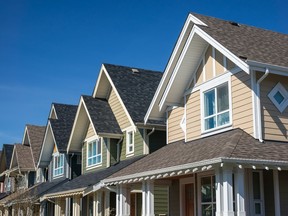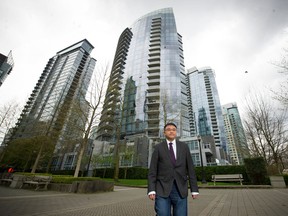Opinion: Housing is at the center of BC mythology. And that is as divisive as any religious sectarianism.

.
BC is possibly the most secular region on the continent.
Announcement 2
.
Fewer people here actively follow a religion than virtually anywhere else in Canada and the US.
.
But that doesn’t mean BC residents don’t have certain beliefs and values as “top concerns.” As theologian Paul Tillich and many others have said, everyone, including the nonreligious, often follows unspoken core beliefs that guide their daily lives. Like a civil religion.
While some people find a kind of religious fervor through their uncompromising commitment to environmental values, hockey, Marxism, or the “invisible hand” of capitalism, it’s no exaggeration to argue that, in BC, housing is at the center of our mythology.
Announcement 3
.
Especially in super-expensive Metro Vancouver and Victoria, housing is the stuff of hopes, fears and dreams, underscored by a disturbing disconnect here between income and house prices.
Some almost love housing, for the sense of comfort it can provide. Let’s also not forget that real estate and related services form the massive center of BC’s society and economy, accounting for an unusually mighty 30 percent of gross domestic product.
Alarmingly, the sometimes dogmatic beliefs we hold about housing, and how to overcome Metro Vancouver’s status as one of the world’s most unaffordable cities, can be as divisive as any suspicious religious sectarianism.
This is definitely not to be taken lightly.
Announcement 4
.
The human need for shelter is fundamental. Simon Winchester’s new book, Land: How the Hunger for Ownership Shaped the Modern World, details how the lure of property has for millennia been a beacon to those who struggled to own in their home countries, due to poverty, discrimination or anything else.
And a survey released this week by the Macdonald-Laurier Institute revealed the harsh reality that 86 percent of Canadian youth they believe it was easier for their parents to buy a house and start a family.
The longing for security and wealth that many expect to accompany home ownership, or a stable rental situation, can be very anxiety-provoking. In many ways, it is understandable that many have come to idolize housing.
ad 5
.

There’s even a biblical name for the sense of injustice some British Columbians have toward those who already have secure housing, who are seen as privileged.
Andy Yan, director of the City Program at Simon Fraser University, who has more than a few ideas about how housing serves as a form of quasi-religion in BC, points to the power of the so-called Matthew effect.
The term comes from the New Testament Gospel of Matthew 25:29, in which Jesus says, “For to everyone who has, more will be given, and he will have plenty; but from the one he does not have, even what he has will be taken away from him.”
Although Jesus was believed to be speaking of spiritual abundance, the Matthew Effect has become a social and economic theory that explains how the rich get richer and the poor get poorer. The concept applies both to status issues and to the cumulative advantage of economic capital.
ad 6
.
The Matthew Effect forms the heart of many doctrinal disputes in BC, where virtually everyone has developed strong beliefs about the causes and solutions of housing inequality.
As Yan says, those who agree with each other are often treated as saints, while opponents are dismissed as sinners.
“There’s an ‘Either you’re with us or against us’ mentality.”
Politicians, developers, pundits and activists, who tend to behave like secular clerics, have a habit of piously intoning their faith in the often self-interested doctrines they believe will solve the housing crisis.
Developers, most politicians, and factions of housing activists repeat the chant about how the real answer lies in supply, supply, supply: that building higher housing density will lower prices. They stereotype their ideological opponents as reactionary, self-satisfied NIMBYs (Not in My Back Yard).
ad 7
.
Another camp believes that salvation lies in curbing home-grabbing by investors, those who already have “plenty,” both domestic and foreign.
Meanwhile, a third camp maintains that the real way forward is through massive amounts of government-funded social housing.
While some believe all three doctrines have merit, the ideological rivalry is still capable of pitting generation against generation, particularly millennials against baby boomers, who are often portrayed as the righteous ones who got everything “right.”
Competing housing doctrines can also pit neighbors against neighbors, with those in densifying Strathcona or Mount Pleasant going after denizens of Shaughnessy’s underutilized mega-mansions or Coal Harbor’s lavish waterfront condominiums.
ad 8
.
Meanwhile, there is no shortage of public figures who strive to polish their haloes — now known as signs of virtue — with their stands in homes. Politicians, planners, commentators and developers can all preach their housing creeds, with many linking their pronouncements, often dubiously, to the holy grails of sustainability and zero carbon emissions.
“As Vancouver finds itself at the start of a civic election cycle that culminates on voting day (October 15), the city yearns for leadership that can bring out the best angels in its citizens to solve its housing problem,” he says. Yan.
“However, the demons of division and performance seem to lurk in the shadows behind many housing platforms. This city will need leadership that builds bridges, rather than walls, between its citizens.”
Given all this religion-style sectarianism, there remain some who still lean towards a spiritual saying that could help us heal, at least a little, from the fragmented housing wars:
-
Douglas Todd: Secularism emerges in Canada, for better or worse
-
Douglas Todd: As Canada falters in the face of a rush of property investors, Singapore backs down
-
Douglas Todd: Why more housing supply won’t solve the lack of affordability
-
Douglas Todd: Immigrants have long yearned to own property
@douglastodd





